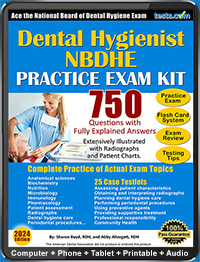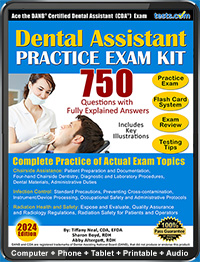NBDHE Dental Hygienist Certification Test
This Free NBDHE Certification Practice Test will give you an idea of the types of questions and sections on your actual exam.
The NBDHE assists state boards in qualifying dental hygienists who seek licensure in their jurisdiction. The exam assesses a hygienist’s ability to understand relevant information including basic biomedical, dental and dental hygiene sciences and the ability to apply the information into a problem-solving context.
When you are ready to start studying and get certified, use our NBDHE Practice Exam Kit with 750 questions and fully explained answers, including 20 Patient Case Testlets.
Abby Altergott, RDH
Licensing of dental hygienists in the U.S. is regulated by the individual states. Currently, all states and the District of Columbia, Puerto Rico, Guam and the Virgin Islands recognize exam results from the National Board of Dental Hygiene Exam (NBDHE). The exam assesses a hygienist’s ability to understand relevant information including basic biomedical, dental and dental hygiene sciences and the ability to apply the information into a problem-solving context.
The NBDHE consists of 350 questions. There are 2 components to the NBDHE:
Discipline-based questions on the following three areas:
- Scientific Basis for Dental Hygiene Practice
- Provision of Clinical Dental Hygiene Services
- Community Health/Research Principles.
Dental Hygiene Patient Cases containing 12-15 patient cases addressing the following knowledge and skill areas:
- Assessing patient characteristics
- Obtaining and interpreting radiographs
- Planning and managing dental hygiene care
- Performing periodontal procedures
- Using preventive agents
- Providing supportive treatment service
- Professional responsibility





